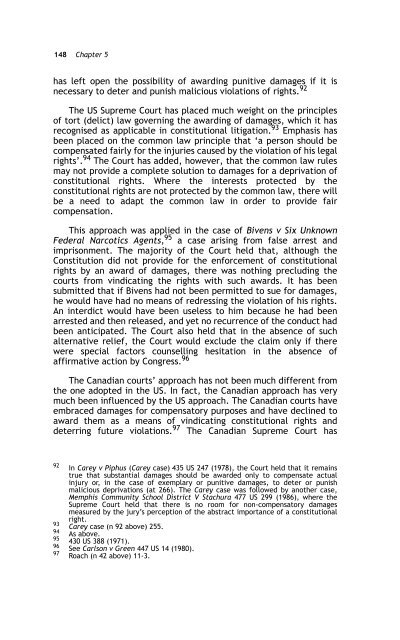LITIGATING SOCIO-ECONOMIC RIGHTS IN SOUTH AFRICA - PULP
LITIGATING SOCIO-ECONOMIC RIGHTS IN SOUTH AFRICA - PULP
LITIGATING SOCIO-ECONOMIC RIGHTS IN SOUTH AFRICA - PULP
You also want an ePaper? Increase the reach of your titles
YUMPU automatically turns print PDFs into web optimized ePapers that Google loves.
148 Chapter 5<br />
has left open the possibility of awarding punitive damages if it is<br />
necessary to deter and punish malicious violations of rights. 92<br />
The US Supreme Court has placed much weight on the principles<br />
of tort (delict) law governing the awarding of damages, which it has<br />
recognised as applicable in constitutional litigation. 93 Emphasis has<br />
been placed on the common law principle that ‘a person should be<br />
compensated fairly for the injuries caused by the violation of his legal<br />
rights’. 94 The Court has added, however, that the common law rules<br />
may not provide a complete solution to damages for a deprivation of<br />
constitutional rights. Where the interests protected by the<br />
constitutional rights are not protected by the common law, there will<br />
be a need to adapt the common law in order to provide fair<br />
compensation.<br />
This approach was applied in the case of Bivens v Six Unknown<br />
Federal Narcotics Agents, 95 a case arising from false arrest and<br />
imprisonment. The majority of the Court held that, although the<br />
Constitution did not provide for the enforcement of constitutional<br />
rights by an award of damages, there was nothing precluding the<br />
courts from vindicating the rights with such awards. It has been<br />
submitted that if Bivens had not been permitted to sue for damages,<br />
he would have had no means of redressing the violation of his rights.<br />
An interdict would have been useless to him because he had been<br />
arrested and then released, and yet no recurrence of the conduct had<br />
been anticipated. The Court also held that in the absence of such<br />
alternative relief, the Court would exclude the claim only if there<br />
were special factors counselling hesitation in the absence of<br />
affirmative action by Congress. 96<br />
The Canadian courts’ approach has not been much different from<br />
the one adopted in the US. In fact, the Canadian approach has very<br />
much been influenced by the US approach. The Canadian courts have<br />
embraced damages for compensatory purposes and have declined to<br />
award them as a means of vindicating constitutional rights and<br />
deterring future violations. 97 The Canadian Supreme Court has<br />
92 In Carey v Piphus (Carey case) 435 US 247 (1978), the Court held that it remains<br />
true that substantial damages should be awarded only to compensate actual<br />
injury or, in the case of exemplary or punitive damages, to deter or punish<br />
malicious deprivations (at 266). The Carey case was followed by another case,<br />
Memphis Community School District V Stachura 477 US 299 (1986), where the<br />
Supreme Court held that there is no room for non-compensatory damages<br />
measured by the jury’s perception of the abstract importance of a constitutional<br />
right.<br />
93<br />
Carey case (n 92 above) 255.<br />
94 As above.<br />
95 430 US 388 (1971).<br />
96<br />
See Carlson v Green 447 US 14 (1980).<br />
97 Roach (n 42 above) 11-3.
















